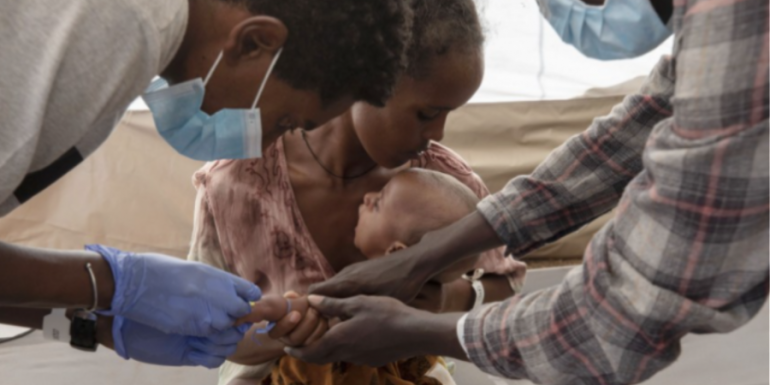At Ethiopia's largest hospital in Tigray province, a child injured in an air raid died of bleeding as gauze and serums ran out. An infant died because he did not have the fluids needed for dialysis.
Doctors at Ayder Hospital in Meckele, the capital of Tigray, which is under the control of local forces fighting the federal army, told Reuters by telephone that the lack of medical equipment and medicine was largely due to the blockade it had imposed. the government for months in the province, blocking access to humanitarian aid.
"Signing death certificates is now our main job," the hospital said in a presentation to international aid organizations seen by Reuters.
The presentation documents and notes also include case summaries, lists of medicines and medical supplies in short supply, and photographs of injured and malnourished patients.
Reuters also interviewed three doctors, who asked not to be named for fear of retaliation by Ethiopian officials.
Doctors reported 117 deaths and dozens of complications - including infections, mutilations and cases of kidney failure - which they said were due to a lack of basic medicines and equipment.
War broke out in November 2020 after Ethiopian Prime Minister Abi Ahmed sent troops to Tigray to oust local authorities belonging to the Tigray People's Liberation Front (TPLF), who defied his authority and accused him of blaming them.
Abi Ahmed announced the victory three weeks later, after the occupation of the regional capital Meckele. But in June the TPLF recaptured most of Tigris and continued its offensive in the neighboring Amhara and Afar districts, from where it was repulsed in December.
The clashes have killed thousands of people and displaced millions.
Government spokesman Legesse Toulou reiterated the government's position on Monday that no blockade had been imposed on Tigray, but did not answer questions about the shortcomings doctors are complaining about in Ayder. "What is happening right now in Tigray is the responsibility of the TPLE," Legese said.
He accused the TPLF of looting equipment and drugs in more than 10 hospitals and 100 health centers after its forces occupied the neighboring provinces of Amhara and Afar.
A TPLF spokesman declined to comment, while the Front has previously denied looting clinics and blamed the government for the shortages.
The UN first sounded the alarm about the lack of access to Tigray in December 2020, when government forces took control of Meckele.
Access to trucks carrying humanitarian aid then increased, but was restricted again when government forces withdrew from most of Tigray in late June, according to reports from the UN Office for the Coordination of Humanitarian Affairs (OCHA).
The Abyssinian government has repeatedly denied allegations by the United Nations and other humanitarian organizations that it is blocking access to aid to Tigray.
De facto exclusion
A doctor in Ayder told Reuters that about 80% to 90% of Tigray's hospitals and clinics are closed. The UN has reported that more than 90% of the province's 5,5 million people are in need of humanitarian assistance and that 400.000 people are living in conditions approaching famine.
Some products and medicines reached the largest cities in Tigray during the first eight months of the conflict, when the province was under government control. But since the end of June, doctors have complained that little food and almost no medical supplies have arrived in Tigray.
The cause of the situation, they note, is the de facto blockade - as described by UN and US officials - imposed on the province by the government. The UN estimates that at least 100 trucks carrying aid will have to enter the province daily to meet the needs of residents. Less than 12% of them have reached Tigray since July, according to OCHA.
For its part, the World Food Program has indicated that the food and fuel available in Tigray will run out in mid-January.
No medicine or equipment has arrived in Ayder since June, three doctors confirmed. The 500-bed hospital has shortages of everything from oxygen to antibiotics and nutritious food for malnourished children.
The rate of malnourished children under 5 admitted to hospital had almost doubled in October to more than 41%.
At the same time the basic medicines in the hospital are running out.
Source: RES-EAP
